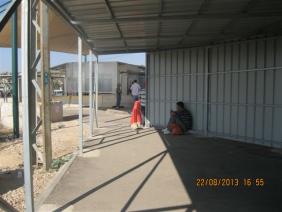'Azzun 'Atma, Habla, Kifl Harith, Za'tara (Tapuah), Thu 22.8.13, Afternoon

Translation: Shelly K.
13:45 Habla Checkpoint – Few Palestinians walk through, some are in their vehicles, all are checked, on both sides, the checkpoint will close at 14:00 as usual.
13:50 – Eliyahu Gate - There is no police presence at the entrance. Right near the gate, there is a square being built: the design (at first) is reminiscent of the ornamentedsquare that was built near the Huwwara checkpoint…(at the turnoff to the settlement of Bracha)
14:14– A vehicle that appears to be military and has a Biblical poster (!?) on it emerges from the Gilad settlement
14:20– Next to the settlement of Emmanuel we see a path to a new road towards a hilltop that is still unpopulated. Who is this meant for?
14:30 - Kifl Harith Checkpoint – Next to the checkpoint which is open, there is an army jeep.
14:40 – Za’atra Checkpoint – Tapuach Junction – In the checkpoint parking lot there are soldiers. They do not check at the positions. On the other hand, outside of the checkpoint, near the settler’s “Trampiada” (towards Ramallah), a car is parked and two soldiers are checking its contents while the passengers wait outside (pictured). As of late this is a usual occurrence.
We visited Hirbet Yinun which is north of Akrabavillage, a small village on the side of the hill. Of the 40 families that once lived here, 6 remain. The settlement Itamar, its homes and agricultural fields, are closing in on every side and threaten to ‘choke’ what’s left of the village. On the southern part, where it is still possible for Hirbet Yinun residents to reach Akraba, the settlers of Itamar frequently drive on their tractors. Lately, they have been seen fully clothed in the village’s drinking water reservoir, small and temporary, but preventing the villagers from drinking the water. An army patrol jeep passes each day along the village borders. The residents are poor and most of them have no cars to leave the village. They must use Taxis (NIS 20 to Akraba and another NIS 30 to Nablus). Olive trees are their means of support, when they are allowed to access the trees and harvest them. It is fortunate that volunteers from overseas live there: the village’s housing is used as a starting point for volunteer activities in other places. We thanked them.
16:00 – Azzun Atma Checkpoint A military command car hides the entrance to the checkpoint. This is the hour that workers return home from a week’s work – there is no crowding on the line. A Palestinian laborer is sent to stand on the side: he went through without a permit and was punished. His papers were taken, and he was told to wait for the police. Delayed and humiliated (see photo). In an evening call to him he said he was freed and allowed to return home at 19:00.
